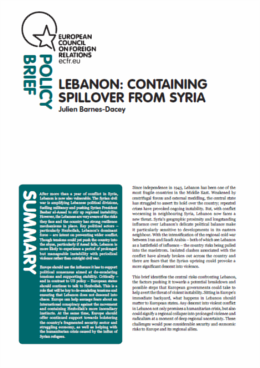Lebanon: Containing spillover from Syria
How Europe can help Lebanon to avoid a descent into chaos
How Europe can help Lebanon to avoid a descent into chaos – sanctions against Hezbollah are not the way forward
After more than a year of conflict in Syria, neighbouring Lebanon is increasingly vulnerable. The civil war in Syria is amplifying Lebanese divisions, fuelling militancy and pushing Syrian President Bashar al-Assad to stir up regional instability. Most significantly, the Syria conflict is shifting the Lebanese balance of power, opening up new possibilities for those intent on weakening Hezbollah, the country’s dominant political and military force.
For the moment key political actors – particularly Hezbollah – are intent on preventing wider conflict, and the country has strong resilience mechanisms in place.While outright civil war therefore remains unlikely, the country is facing a period of prolonged instability. In a worst case scenario tensions could still push the country into the abyss.
In a new ECFR policy brief, “Lebanon: Containing spillover from Syria”, Julien Barnes-Dacey argues that Europe should use its influence to support efforts aimed at forging political consensus and deescalating tensions. In particular, European states should – in firm contrast to US policy – continue to talk to Hezbollah in order to assuage fears about an international conspiracy against the movement and contain its more incendiary instincts.
Calls by the British and Dutch foreign ministers last Friday for EU sanctions on Hezbollah’s military wing should be rejected. European pressure on Hezbollah at this moment could provoke an offensive response to the detriment of Lebanon’s fragile stability. Current uncertainties should not be seen as an opportunity to weaken Hezbollah – and by extension its patron Iran.
What Europe should do:
- Talk to all sides: European states should offer firm support for consensus politics aimed at deescalating tensions. This will necessitate Europe taking a different line from the US, primarily by continuing engagement with Hezbollah.
- Focus on security: European states must back efforts aimed at strengthening Lebanon’s institutional capacity to resist dangerous escalation. This should include greater support for the Lebanese Armed Forces (LAF) and maintaining a commitment to the United Nations Interim Force in Lebanon (UNIFIL).
- Smart use of economic tools: Europe should channel economic assistance towards the north of the country and resist pressure to sanction Lebanese banks.
- Help with the humanitarian crisis: The huge influx of Syrian refugees may strain Lebanon’s economic and social fabric. Europe must step up to share the burden of this humanitarian crisis.
“Lebanon can overcome the challenge of destabilisation. But Europe must do all it can to support this process. Its support, pressure and dialogue with all parties can act as a force for both stability and positive reform.” – Julien Barnes-Dacey
Key facts:
- Lebanon shares a 375km-long border with Syria.
- Power is distributed among communal groups according to pre-assigned quotas, creating a weak central state.
- Syria has long exploited Lebanese vulnerabilities. Since its military withdrawal in 2005 Syria has remained a crucial power broker in Lebanon especially through its support of Hezbollah.
- Hezbollah is a Shiite militant and political movement that was founded in 1982 in response to Israel’s invasion. Its non-state militia is Lebanon’s strongest armed force.
- The US government lists Hezbollah as a terrorist organisation. Europe does not and many member states maintain some form of relations with the movement.
- Lebanese politics is split between two main coalitions: the pro-Syrian ‘March 8’ bloc currently in power (Hezbollah, Amal party, Christian Free Patriotic Movement) and the ‘March 14’ opposition bloc (Future Movement, Lebanese Forces, Phalange Party).
- The EU is Lebanon’s most important trading partner: The EU accounts for 29% of Lebanon’s total trade in 2011 (worth €5.6 billion).
The European Council on Foreign Relations does not take collective positions. ECFR publications only represent the views of their individual authors.



